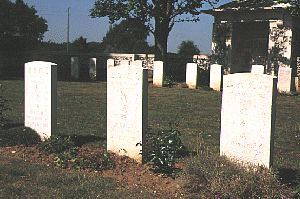A Foreign Field
We crossed from Hull to Zeebrugge with North Sea Ferries, and spent three days visiting Flanders, Artois, Picardy, Champagne, Burgundy, Auvergne, the Bourbonnais and the Gorges du Tarn, on our way to the cottage we had booked in Gascony, not far from Toulouse. We spent a week exploring the nearby villages, plus an outing to Carcassonne, and then took four days to come home through Armagnac, Cognac, the Bordelais, Charente, Limousin, Berry, Brenne, the Sologne, Maine, Normandy, Picardy, Artois and Flanders. Of all those romantic names of ancient provinces, perhaps the three most familiar to the English apart from the ones whose names have been borrowed by local wines will be Flanders, Artois and Picardy. In Flanders fields, as we are all aware, the poppies grow between the crosses, row on row. Roses, on the other hand, are what bloom in Picardy. In Artois the country round Arras the heaviest crop is by far the crosses. I've been preparing a talk on French War Memorials, so we thought that on our way through we would try and photograph as many different war cemeteries as possible.
The First World War was perhaps the last in which most of the casualties were suffered in the front line. There are places in the North of France where almost every field has its cemetery, and a cart track disappearing through a hedge will have as many as four signposts at its entrance. Within a few miles we had found British, French, German, American, Canadian, South African and Australian cemeteries and memorials, each with its quota of graves for its own people, and mingled with each a few, as it were, visitors whom fate had cast among strangers. In the Australian cemetery there rests an unknown Private of the Lincolns; among the French a sprinkling of Senegalese or Moroccans.
I have been here before. The dreadful, overwhelming waste of young manhood came home to me the first time, the second, the fifth perhaps. Now I am beginning to observe only the significant details. War is like that; it sneaks up and anaesthetizes you, and only a sudden jolt reminds you that each stone is a life as vital as your own only, shorter. One can begin to take those stones for granted. And then we saw another signpost, pointing down a track impassable to the car but plainly marked. Ayette Wood, it said, Chinese and Indian Cemetery.
It was very small, and very beautiful, and very sad. Perhaps there were thirty graves; certainly no more than forty. The grass was neatly mown, the flower-beds between the gravestones had roses and marigolds. Beyond the chestnut trees which shaded them, sleek cows cropped the grass of a green meadow. Each stone was neatly carved in two languages; Chinese and English, Chinese and French, Bengali and English. Each name carried a rank or title. Among the Indians some were military ranks recognizable from stories of the Raj: Jemadar, Sowar, Lance-Naik. But many of the Indian graves carried the title, Driver, and about half of them, and all the Chinese, were labelled Labourer. Here was a place that touched me to the heart. Here were the bones of men who died digging trenches in stinking mud, ten thousand miles from home. To this place they had come six weeks on a ship through minefields and torpedoes, two weeks marching on shell-pocked roads, to a country where there was nothing left to see, with a language they did not understand, for a reason they would never know. No history book records their names or their achievements; the custom of their time treated them as less than men; they were Chinese labourers, coolies, lascars, always a collective noun. Only in death, and in this place, was their humanity, their individuality recognized.
Have we learned? Do we progress? Do we still see other races as creatures to be used, existing in herds like cattle? Or is our concern for Sierra Leone or Iraq or otherwhere based on a recognition of individual worth? God knows every hair of every head, and marks the fall of a sparrow. Every life is as important as my life, every consciousness is the centre of the universe; before God we are all equal; in life as well as death.
